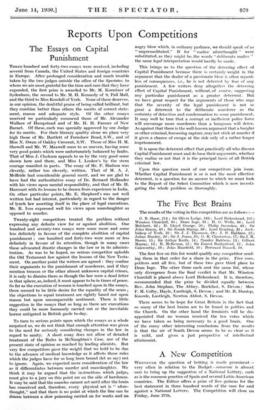The Five Best Brains The results of the voting in
this competition are as follows :- G. B. Shaw, 214 ; Sir Oliver Lodge, 183 ; Lord Birkenhead, 162 ; Winston Churchill, 95 ; Dean Inge, 91 ' • H. G. Wells, 86 ; Lord Melchett, 62 ; D. Lloyd George, 50; Philip Snowden, 48 ; Sir John Simon, 45 ; Sir Josiah Stamp, 39 ; Lord Reading, 35 ; Arch- bishop of York, 32 ; Sir J. J. Thomson, 28 ; J. B. Haldane, 23 ; Julian Huxley, 20 ; Sir J. Jeans, 20; G. K. Chesterton, 17; Sir J. M. Barrie, 15 ; Sir Arthur Keith, 14 ; Stanley Baldwin, 13 ; Gilbert Murray, 13 ; R. McKenna, 12 ; Sir Ernest Rutherford, 12 ; John Galsworthy, 10 ; John MaSefield, 10 ; Bertrand Russell, 10.
The first five on this list would qualify any competitor send- ing them in that order for a share in the prize. Five com- petitors sent all five, but of these two gave third place to Dean Inge. The other three each sent the same list, whose only divergence from the final verdict is that Mr. Winston Churchill is placed above Lord Birkenhead. It is, therefore, recommended that the prize be divided equally between Rev. John Stephan, The Abbey, Buckfast, S. Devon ; Miss F. M. Colby, Hayle, Lustleigh, S. Devon ; and Mr. R. Dunlop, Knowle, Lustleigh, Newton Abbot, S. Devon.
There seems to be hope for Great Britain in the fact that so many of the best brains are to be found in politics and the Church. On the other hand the feminists will be dis- appointed that no woman received the ten votes which we have taken as being necessary to a good brain. One of the many other interesting conclusions from the results is that the air of South Devon seems to be as clear as it is mild, and gives a just perspective of intellectual attainment.


































 Previous page
Previous page